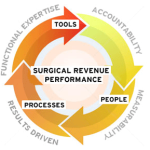How EHR adoption benefits your revenue cycle management
The adoption of electronic health records can benefit all sorts of medical institutions, from the largest hospitals to specialists or practices in smaller communities. EHRs can reduce costs by making administrative tasks more efficient as well as promote better patient outcomes by empowering doctors with new tools and clinical information. As the industry transitions to promoting value-based care models, EHR systems are equally important for sustainable revenue cycle management.
According to Greenway health, smaller windows of profitability and decreasing reimbursement rates can be off-set with the right IT vendor. These platforms allows administrators to be more proactive when it comes to catching potential errors. Likewise, they can minimize errors that lead to costly denials or other mistakes. For practices of all sizes, EHR adoption can be incredibly effective in re-tooling financial workflow and protocol in a changing healthcare landscape.
Making data entry easier
Paper records can be difficult or expensive to track and store, and can be susceptible to human error as a result of rushed doctors or unsure patients. From admissions forms to insurance claims, a missing piece of information or simple mistake can lead to extra costs for your business. Yet with an EHR, your practice can flag delinquencies easier and track payment errors or delays.
EHR platforms can handle all sorts of administrative tasks that not only reduce the possibility of expensive oversights or mishaps but also make tracking information easier. By integrating EHR data into a RCM system, it can be easy to visualize or quantify daily work flow, new trends and areas of concern that could require more support or a new policy, Revenue Cycle Insights reported.
Check out these testimonials about how our #EHRs can save your practice countless hours and frustration: https://t.co/xdSaocXlww
— Exscribe EHR (@ExscribeEHR) March 21, 2016
Promoting high-value tasks for doctors
Another reason EHRs are so important to your practice is because they give your medical staff the tools to input patient data and billing information at the point of care. In this way, they can spend less time plugging in clinical information and have more time to work on high-value tasks.
Revenue Cycle Insights also found that access to financial information can empower doctors beyond freeing up a daily schedule. Physicians or surgeons may feel more comfortable trying new treatment plans with the confidence that the provider will be reimbursed. Similarly, it may be possible to identify procedures that have high rates of denial and pivot to a new plan of action.
Streamlining administrative efforts
Your practice will benefit from the adoption of a robust EHR platform in the form of more efficient daily workflow, but overtime, you can stabilize revenue cycle management by leveraging the amount of data and analytics allowed by such a software.
Billing information can be delivered more quickly and efficiently, which allows your practice more accuracy when plotting your financial outlook over the next few months. This information can be backed up with real clinical data that is specific to your business and your patients. As your administrative team makes decisions and identifies new protocols, they will be armed with intimate and extensive statistics to inform best practices.



